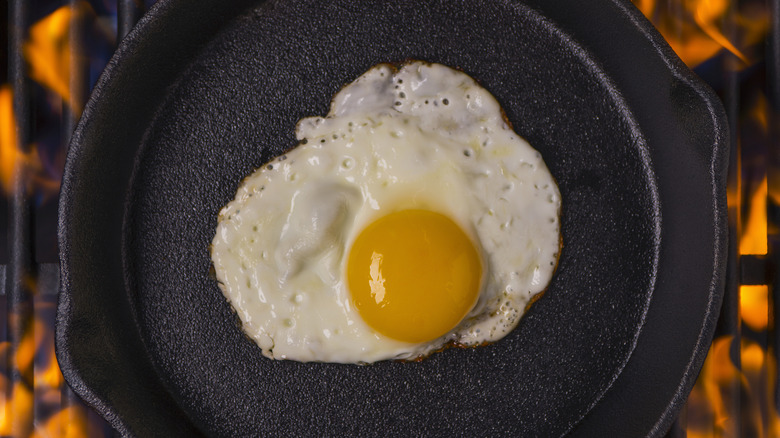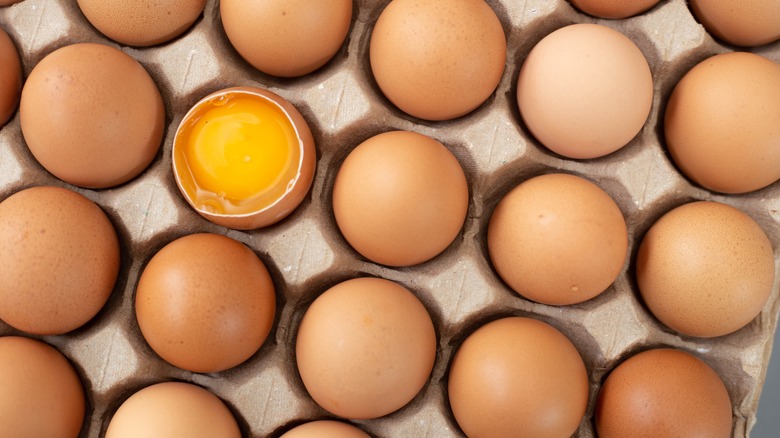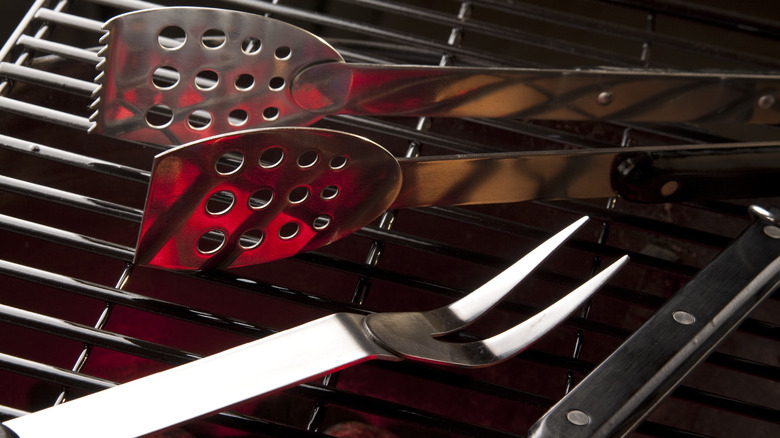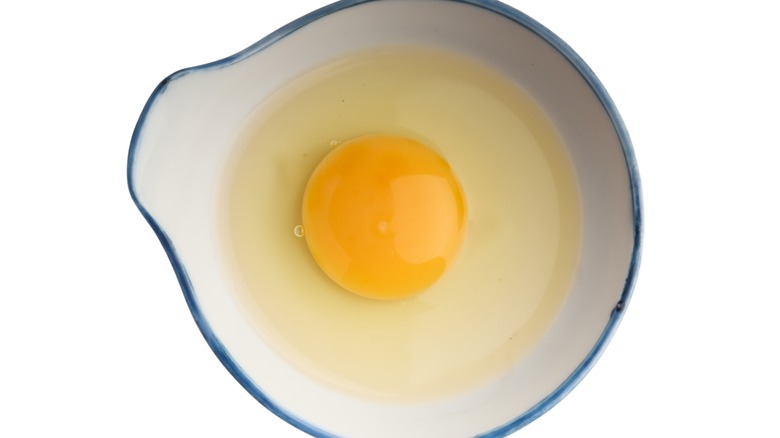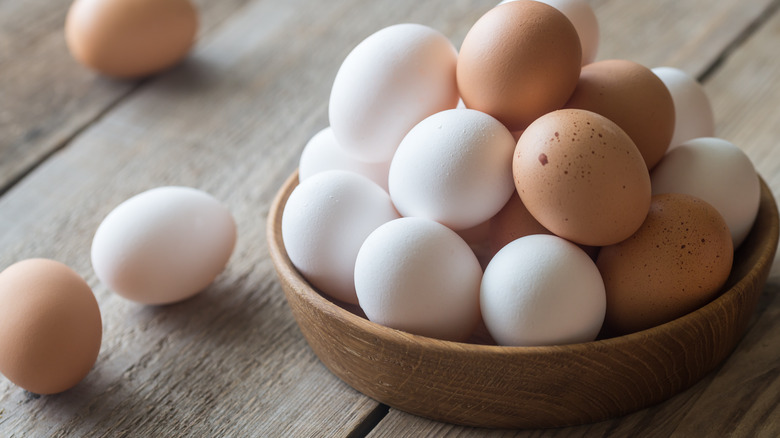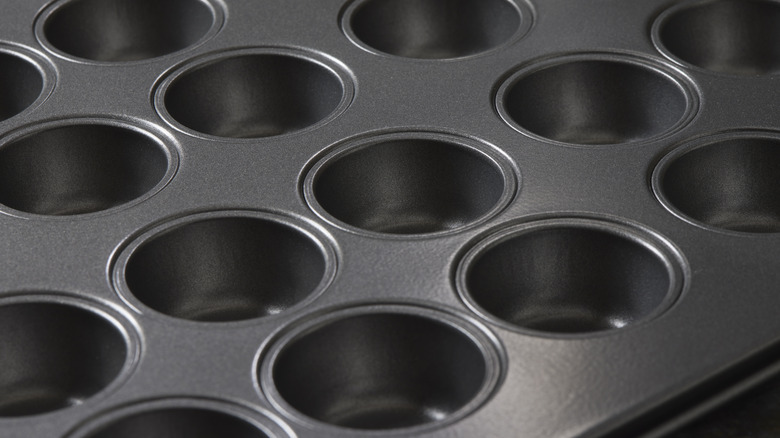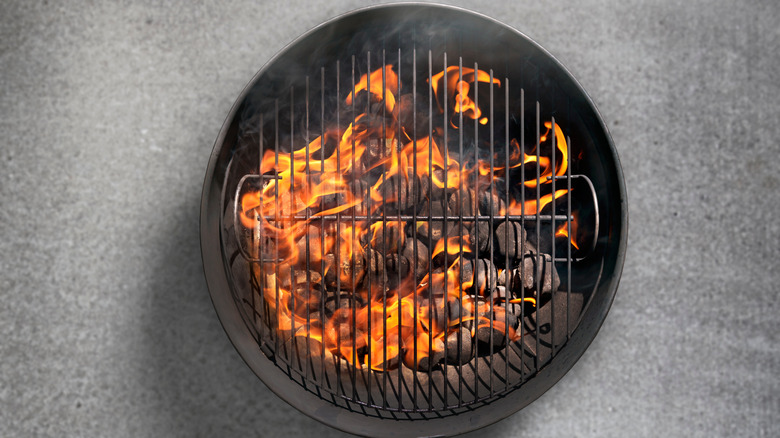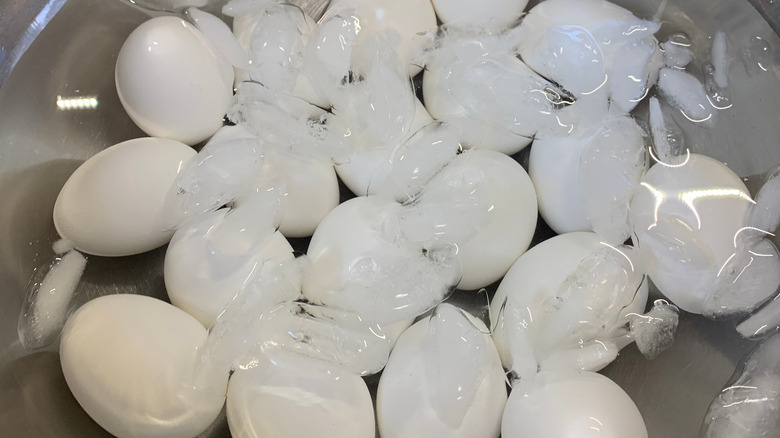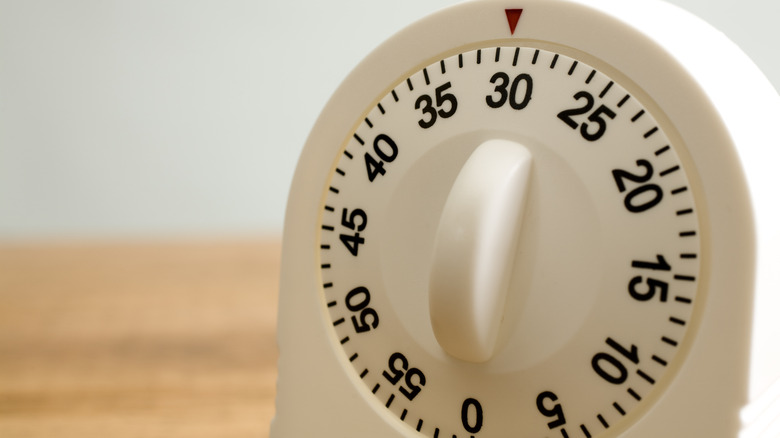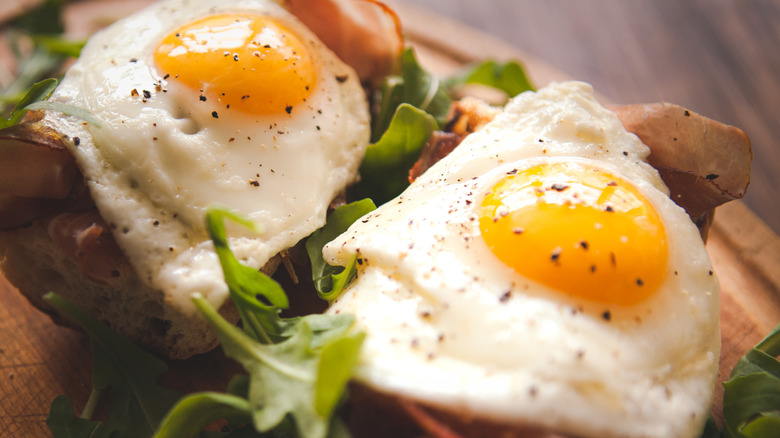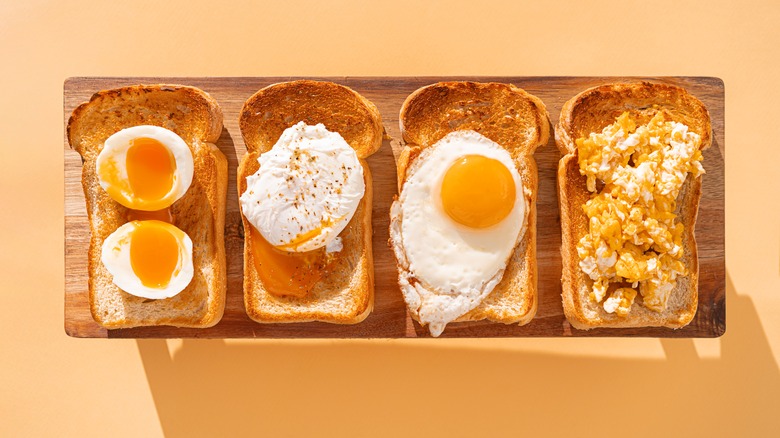Your Guide For Grilling Eggs This Summer
Grills are well-known for the smoky, seared flavors they can bring to meats, veggies, and kabobs, but there's no reason to let the fun end there. Pretty much whatever food staple you could cook in a kitchen, you can cook on a grill, and that includes eggs. Summertime camping trips may have already led to you trying your hand at preparing a breakfast skillet over an open flame, but even if you don't have your kitchenware on hand, all isn't lost — you can still make an eggcellent meal with just a little bit of practice and know-how.
Whether you're on a cross-country backpacking trip or you're grilling your eggs in the relative comfort of your own backyard, grilled eggs can make for a unique addition to any meal. Though generally thought of as an early morning meal, eggs are versatile and can add a lot of character to your plate regardless of the time of day when you serve them. Particularly when paired with grill-friendly veggies like potatoes, tomatoes, or peppers, eggs can work either as a side or the main event. So, how does one go about grilling an egg? Well, we have a few ideas.
Choose how you want to grill your eggs
Whether you have all the amenities of your kitchen a few feet away or you're roughing it in the wilderness with a more limited array of tools, figuring out what exactly you're going for will help you achieve the best results while eliminating any last-minute guesswork. With the volatile nature of an open flame, you want to have most of these choices locked down before you get started.
As usual with grilling, whether you use wood, gas, or other options will make a subtle difference in the end result. The wood plank you choose can change the overall taste profile, so be intentional when considering just how exactly you want to grill these eggs. If seeking a sweeter taste similar to hickory, consider using pecan. If looking for something a bit more mild and fruity, apple may be the choice for you. For something a little stronger than apple, oak can give more of a mid-range smoky flavor. Any wood will cook your eggs, but these are all solid choices for adding a unique overtone to your dish.
Get your tools ready
To be clear, the only tools absolutely required to grill eggs are, well, a grill and some eggs. Still, there are plenty of ways to make this whole process a lot easier on yourself, and the first is to choose the right tools. As noted, you can use an array of methods for how to place the eggs on the grill, with some chefs opting for whole eggs and others using simple, handmade aluminum foil baskets to keep cracked eggs from running right into the flame. Once you've got this figured out, you can move on to accessories.
There are a lot of additional grilling tools out there to suit any cook's specific needs and temperament, but a few tried and true classics will help you get your egg grilling method squared away. If using a skillet, definitely bring a metal spatula for flipping. Long-handled tongs can help increase safety by putting some distance between you and the flame while allowing for an easy turn that won't crack your eggs. Finally, a handy timer will help you gauge where your whole eggs are at in the cooking process without relying on guesswork. Even if you're using foil or pans, it's easy to wander away from a grill while chatting up the neighbors, so be sure to set a timer to avoid a smokey catastrophe.
Consider using a cup
Grilling eggs in a muffin pan may sound like a pretty straightforward process, but as anyone with experience can tell you, those neat little circular holding cups can lead to a lot of mess if you're not pouring methodically. Even if you are alert and engaged during this part, cracking open individual eggs one by one and aiming them perfectly into their containers while keeping the flame under control is no simple task. Fortunately, people have been thinking of ways to keep eggs under control while cooking for some time, so there is one big hack that could help.
Keeping your concentration while filling the baskets is key, but you can make the process easier on yourself by cracking your eggs into a cup before pouring them into the muffin pan. This will give you more control over the pour and allow for some space to remove any accidental fragments that may have found their way into the bowl without having to reach into a hot pan. It's a minor step, but it can make a big difference in the long run, particularly if this is your first time grilling eggs and you're feeling at all nervous about the undertaking.
Be very careful with whole eggs
Naturally, one downside of working with whole eggs and putting them on the grill is that the shell tends to break pretty easily, so it's important to handle them with care. Breaking the eggs likely won't completely ruin them, but it will add a little bit of a weird taste alongside a more rubbery, less palatable texture. In general, it's best to either intentionally choose open-face eggs for an even cook or to simply take a little extra care to keep your raw eggs intact. For starters, bringing the eggs to room temperature before adding them to the grate can avoid any cracking caused by temperature extremes.
Tongs will go a long way in helping you arrange the eggs delicately without breaking them. Additionally, always keep in mind basic health and safety precautions when handling eggs, as salmonella bacteria can easily hide within an uncracked egg. Proper refrigeration techniques, careful hand-washing and cleanliness, and keeping an eye on the expiration date are all ways to prevent any potential food-borne illness. However, be sure not to wash the eggs, as there is a protective mineral oil coating that actually helps to prevent bacteria from compromising the egg.
If using a pan, oil it well
If taking the muffin pan route, the first thing to be sure of is that you grease the insides of the baskets to avoid sticking. If you have a pastry brush, that will help with achieving a complete coat, but you can also use a paper towel, or even an unused paintbrush in a pinch. The most important thing is to make sure you're covering the bottom, sides, and corners of each cup fully, as trying to pry a stuck egg out of a small space is definitely something to avoid at all costs.
There are plenty of options for what substance you use to oil the pan, and each has its individual upsides. For instance, plenty of cooks may opt to use butter or margarine due to the creamy, rich qualities it brings. Extra virgin olive oil is a great, flexible oil that has many of the upsides of vegetable oil that provides a more complex taste along with a crunchy texture to the edges.
Keep the flame low and steady
There are some basic things that are easy to forget when preparing for a big cookout, but it's best to keep them in mind lest you find yourself scrambling mid-grill. For starters, always be sure to properly clean your grill. Taking a wire brush to the grate can prevent any odd flavors or sticking, and dumping the ash before you begin is just an overall good practice to get into the habit of. Many people use a raw onion to deglaze a grill to go over the grate a second time as this tends to clean up bits and pieces left over by the exercise.
Another key thing to keep in mind is that grill temperature consistency matters. Just as when cooking most things on the grill, making sure you've reached the appropriate temperature and figuring out how to maintain it will help you avoid catastrophe. Some grills come with built-in thermometers, but even if you don't have that benefit, you can always use the approach of holding your hand at a safe distance over the grate to gauge the heat level. Keep the vents open to ensure ventilation, and don't be afraid to close the lid if you seem to be losing heat.
Have an ice bath for whole eggs
Like when you hard boil eggs, whole grilled eggs will continue to cook after you remove them from their heat source. As such, it's good to have a plan in place after you've pulled them from the flame. While you could simply set them off to the side and wait for them to cool down, a faster and more efficient method is to prepare a bowl of ice water to place them in when the grilling is complete. This grants a bit more control over the undertaking, allowing you to better time the task of grilling and eliminating any guesswork in how the eggs turn out.
Not only does this help with better planning the whole operation from beginning to end, but it also makes the eggs easier to peel by contracting the egg whites while they're still inside the shell. While it does add an extra step, it's an easy one, and worth the forethought it takes to implement. The chilling of the eggs will take less time overall as they are only about 10 minutes in an ice bath to fully cool.
Get the timing right
While we mentioned the importance of having a timer on hand when you're working the grill, each of the different methods of grilling eggs will come with specific suggestions for exactly how long they need to spend over the flame. For whole eggs, the time spent is mostly according to your preference for how well-cooked you prefer your eggs to be, with a range of six to 14 minutes, leaving a bit of space for experimentation. The softer you like the yolk, the less time you should leave them to cook, but even if you're looking for a jammy profile, making sure the whites are safe to eat is key. Fortunately, grilling eggs is a pretty fast process, so testing one at about 10 minutes can help you decide which direction you want to go.
Eggs grilled in skillets will be fairly easy to judge based simply on how they look, while muffin pans are better to time out to avoid pulling too soon. Leaving them on for about eight minutes will give them time to cook all the way through. If using foil, the same method applies, but keep in mind that foil is thinner and may lead to a faster cook time. Check them by poking one with a fork at about six minutes to see how far they still have to go. If all else fails, use your handy meat thermometer to make sure everything is up to temp.
Don't forget the seasoning
Grilling is capable of bringing out so much flavor in anything you cook that it's easy to forget that seasoning can still seriously enhance your enjoyment of the meal. Remembering seasoning when grilling pretty much any food is always a good move, and that applies to eggs, too. While you can leave marinades for the veggies, meats, or tofu, oil always adds a bit of flavor. For any open-faced eggs you're cooking, consider not just oiling the pan, but giving a little spritz of olive oil over the top to infuse some of that herbal taste that it's known for.
As for spices, it may go without saying that a basic salt and pepper shake-over can do wonders for eggs, but consider expanding to include a light dusting of paprika over the top. This will suit most uses you would have for the eggs, and works particularly well in egg salad or deviled eggs. Garlic powder or garlic salt can give your meal an extra bit of kick, while a peppercorn medley can introduce a bit of complexity to the flavor. As for sauces, a simple hot sauce will suffice, but choosing between vinegar and tomato-based sauces alone will likely keep you busy for some time.
Use your tried and true eggs recipes
Once you figure out all the details about how you prefer to grill eggs, how long you want them to stay on the grill, and what tools and seasonings you like to use to pull it all off, you'll be left with the question of what to do with them once they're done. Given the general versatility of eggs, there are a lot of options here, but the fact is that however you eat eggs in the kitchen will work for eggs you've pulled off the grill. Try these morsels in any of your favorite egg-based dishes, and don't be afraid to rely on the classics. Simply eating them with hash browns or toast can be the best choice, so there's no need to reinvent the wheel.
Grilled eggs also work exceptionally well in salads, particularly spinach salads with sunflower seeds, carrots, or other sweet and mild ingredients that allow the smoky flavor to shine. If making egg salad sandwiches, consider grilled eggs instead of hard-boiled ones. Tossing a few veggies on the grill next to the eggs can easily create everything you need for a complete meal, or consider chopping grilled veggies into smaller pieces and cooking them in the egg cups if using the muffin pan approach. There are plenty of options for experimentation, but grilled eggs will taste good just about any way you eat them.
